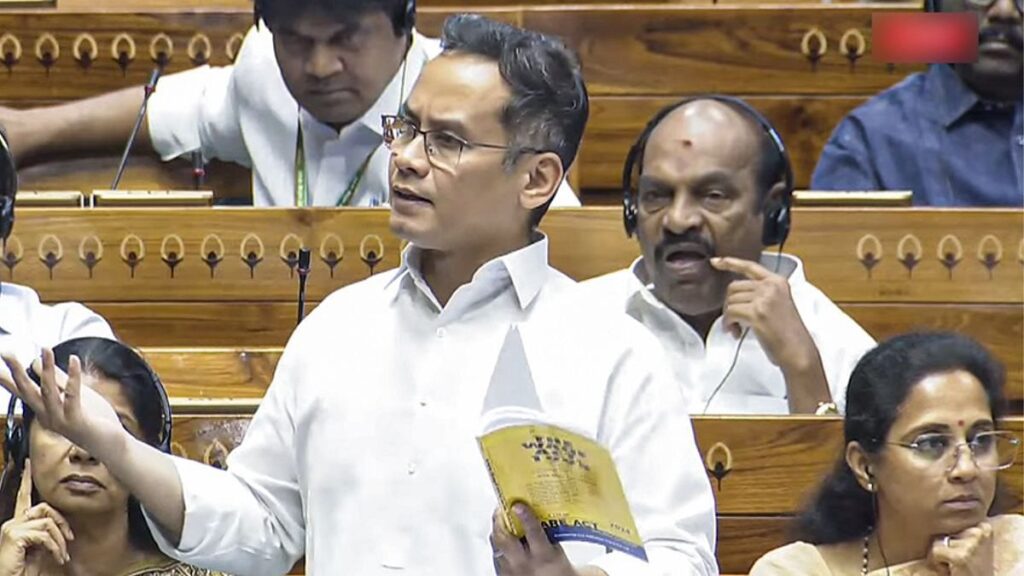New Delhi: A united Opposition charged at the Centre Wednesday, accusing it of trying to divide Muslims and disempower them through the “unconstitutional” Waqf (Amendment) Bill 2024.
The controversial bill was tabled in the Lok Sabha by Minority Affairs Minister Kiren Rijiju amid uproar.
Leading the Opposition charge in the waqf debate, Congress MP and deputy leader in Lok Sabha Gaurav Gogoi accused the Narendra Modi government of using the Waqf bill to “dilute the Constitution, divide the minority communities, divide Indian society and disenfranchise the minority community”.
Meanwhile, Dravida Munnetra Kazhagam’s (DMK’s) A. Raja and Trinamool Congress’s (TMC’s) Kalyan Banerjee questioned the constitutionality and legality of the bill, which they said “forces” an individual to practice their own religion in order to donate property to waqf—a clause they called illegal.
Raja added that while the government has used the example of a village in Tiruchirapalli district in Tamil Nadu, where thousands of acres were ostensibly declared as waqf property, “their story has been demolished” after the authorities deposed before the Joint Parliamentary Committee (JPC).
Samajwadi Party (SP) chief Akhilesh Yadav meanwhile called the bill a “nakami ka pardah” (a veil to cover the failures of the government), and alleged that all over the country, railway and defence land is being encroached upon, while Chinese villages are propping up on Indian territories.
Congress leads Oppn charge
“This objective the bill aims is to dilute the Constitution, it is aimed at defaming the minority community of India, dividing Indian society and its fourth aim is to disenfranchise the minority community,” said Gogoi.
Gogoi acknowledged the need for amendments, but stressed that the aim of such changes should be to strengthen the bill rather than exacerbate problems and disputes, something he said would happen as a result of the current proposed amendments.
He further said that the government’s move to bring changes to the waqf law was part of a broader agenda to encroach upon the properties of Muslims.
Gogoi warned that the government would target other minorities in the future too. “Today they have their eyes on one minority community’s land; tomorrow it will be another’s,” he said while accusing Rijiju of misleading the House with regards to his claims about the previous UPA government.
Stressing that his only “guide” is the Indian Constitution, Gogoi said “so many of their (NDA) state governments did not allow people to offer namaz on Eid”.
The Congress MP also questioned Rijiju’s claim that the UPA government had “transferred 123 properties to the Delhi Waqf Board” before the 2014 Lok Sabha elections. “Whatever he said about the UPA government with regard to 2013 is a complete lie. We demand Rijiju authenticate his claims. He levelled accusations and misled repeatedly.”
Accusing the BJP of lacking sensitivity toward minorities, Gogoi questioned the BJP’s representation of minority MPs in the Lok Sabha. He also alleged that the minority affairs ministry had held five meetings on the bill but never discussed the need for a new waqf law.
The Congress leader said the government did not accept even a “single amendment of the Opposition” even as it claimed to have listened to everyone’s opinion.
Oppn questions clause to prove Islamic practice
The deputy leader of opposition in the Lok Sabha also expressed concerns over a provision in the bill under which individuals need to prove that they practice Islam to access waqf properties.
“The situation of minorities is such in the country today that they will have to give a certificate of the religion they follow,” Gogoi said, asking if other religious communities would be required to provide similar certificates in the future. “Why is the government interfering in this matter of religion?”
Calling this particular clause completely unconstitutional, TMC’s Kalyan Banerjee said no citizen of this country needs to “practice” a certain religion to be deemed to have that religious identity.
Arguing that pending litigations in waqf matters is no grounds for bringing this bill, Banerjee further said that there are 64,687civil cases, and 18,235 criminal cases pending in the Supreme Court, while the number of pending cases related to waqf are less than 15,000.
Banerjee and A. Raja specifically questioned the clause of the government, which enables the district magistrate to adjudicate in disputed cases. It is contrary to the principles of natural justice for one to judge in their own cause, Raja said.
Moreover, while the decision of a DM can be challenged in court, if the case remains sub judice for 30 years, the property will be deemed government property for 30 years, he said.
Raja further questioned the irony of the BJP speaking on Muslim welfare given that the party does not have a single Muslim MP.
Emphasising that this bill puts a question mark on the integrity of the country, Raja said, “Is it not paradoxical that the sovereign will of this country deemed to be reflected in this house is diametrically opposite to the sovereign will reflected in the Tamil Nadu assembly? This will question the integrity of this country.” The Tamil Nadu assembly had passed a resolution to urge the Centre to withdraw the bill.
(Edited by Gitanjali Das)
Also Read: Why Kerala’s Catholic bishops are throwing their weight behind Waqf Amendment Bill


